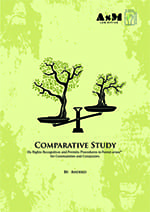Date: January 31, 2017
Indonesia is a developing country that is rich in natural resources, and consequently the Indonesian government continues its efforts to improve models of natural resources use. According to Article 33 of the Constitution of 1945, models employed for use of natural resources must serve the purpose of prosperity for the people of Indonesia.
The root cause of conflicts over natural resources and agrarian issues usually stems from inequality of land tenure and control over natural resources. This inequality causes uncertainty concerning the ‘rules’ set forth by the relevant authorities. Therefore, this study attempts to present a comparison of the rights recognition and permit procedures for the utilization of natural resources, specifically forests, for companies and communities.
The objective of this study is to understand the differences in practice as experienced by the business world compared with the experiences of communities, namely farmer organizations, villagers and indigenous peoples, in securing their rights and maintaining access to lands and forests.

